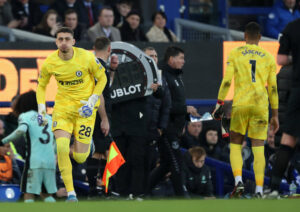Josh Cavallo, men’s football’s only known top-flight gay footballer, has said he is ‘scared’ to compete at the 2022 World Cup in Qatar for Australia.
Fans, governing bodies, leagues, clubs, managers, former and current players all supported Cavallo when he emotionally spoke about his sexuality in a video published last month.
Josh Cavallo ‘scared’ to compete in Qatar World Cup
Josh Cavallo’s interview
The Adelaide United left-back told The Guardian that he would be fearful of the treatment he receives if he went to Qatar for the World Cup.
“I read something along the lines of that [they] give the death penalty for gay people in Qatar, so it’s something I’m very scared [of] and wouldn’t really want to go to Qatar for that,” he said.
“And that saddens me. At the end of the day the World Cup is in Qatar and one of the greatest achievements as a professional footballer is to play for your country, and to know that this is in a country that doesn’t support gay people and puts us at risk of our own life, that does scare me and makes me re-evaluate – is my life more important than doing something really good in my career?”
The 21-year-old also revealed he was hiding his sexual identity from his family and friends. After overcoming this, Cavallo’s impact is already being seen with players contacting him privately for comfort and advice.
“There are people who have reached out to me in confidentiality and said: ‘I’m struggling with the same thing Josh,’ and they’re professional footballers too. And look, it’s something you can’t rush. [I say] you want to be yourself, and at the end of the day I wasn’t happy and now look at me, I’m honestly on top of the world.
“They like the sound of that and they say: ‘Josh, I haven’t experienced that before and I want to,’ and I say: ‘It’s in your hands, it’s your journey and there’s a light at the end of the tunnel.’ I didn’t think there was but there definitely is.”
Qatari laws
Cavallo was right in saying Qatar’s laws criminalise homsexuality and it is punishable by death.
A Stonewall report from 2019 found that same-sex marriage is prohibited and a same-sex couple is deemed unsuited to be a guardian. Ministers may prevent LGBT+ from entering the country, or even deport them due to their identity. Also, trans people are unable to legally change their gender.
In 2019, World Cup chief executive Nasser al-Khater insisted fans of all backgrounds are welcome at the tournament but stopped short of supporting showing public display of affection.
“I would like to assure any fan, of any gender, (sexual) orientation, religion, race to rest assured that Qatar is one of the most safe countries in the world — and they’ll all be welcome here,” he said.
“The safety and security of every single fan is of the utmost importance to us. There’s a lot of training going into security personnel to make sure that things that are culturally different are seen in that frame.”
He added: “Public displays of affection is frowned upon, it’s not part of our culture – but that goes across the board to everybody.”
Questions for FIFA
FIFA was one of the parties to support Cavallo when he released his video in October.
They tweeted: “‘I’m a footballer, and I’m gay.’ You no longer have to hide who you are @joshuacavallo. You are not alone, as the football community around the world today has shown. We are very proud of you. Your words will be an inspiration & support to so many.”
If football’s global governing body failed to directly back a watershed moment in the sport, then criticism would have been seismic.
Equally, critics fail to accept their loose words when evidence suggests they do not fulfil their duty of care role. Blatantly, handing Russia and Qatar World Cup’s in the first place, despite their human rights records, suggest they have little passion for actually supporting ethical causes.
Cavallo admitting he fears for his life if he plays in Qatar should bring greater scrutiny on the FIFA and FIFA president Gianni Infantino.
This follows on from Finland’s Tim Sparv penning a critical view on FIFA and the 2022 World Cup in September. He said “many people are still sleeping” on the problems of the Qatar World Cup.
FIFA could be seen as one of the figures Sparv was referring to due to their failure to properly police their ethical conduct.
Now, a player is scared to play football at their tournament because of their decision making. This scrutiny will only intensify in the build-up to the competition.
Main Photo






